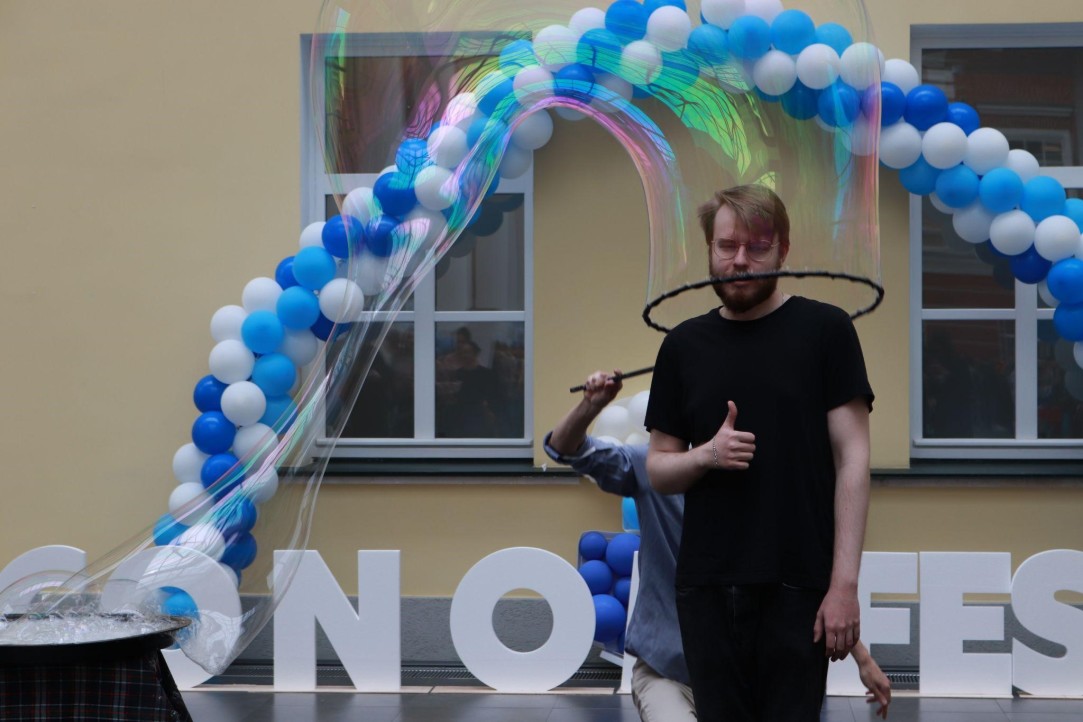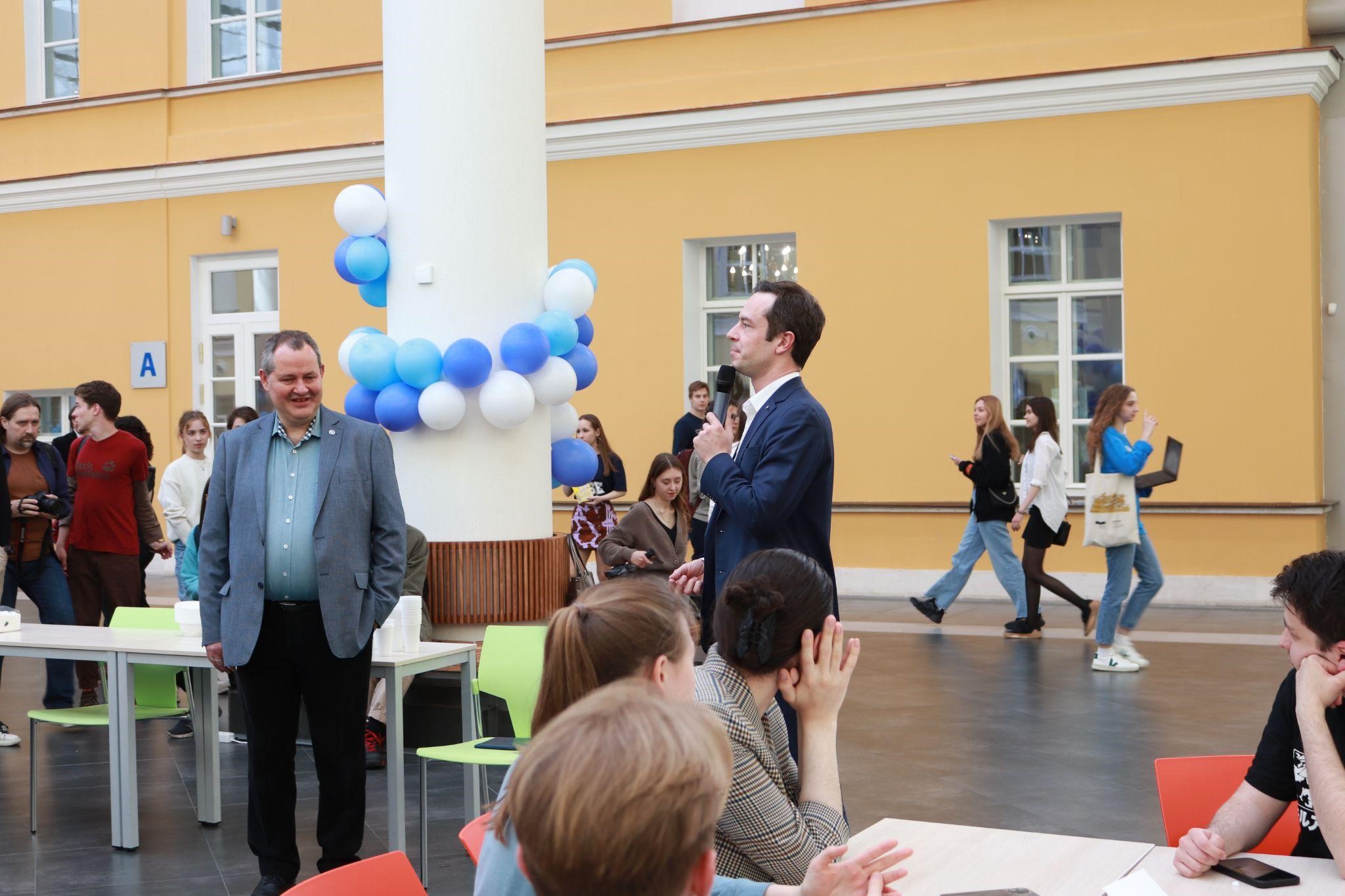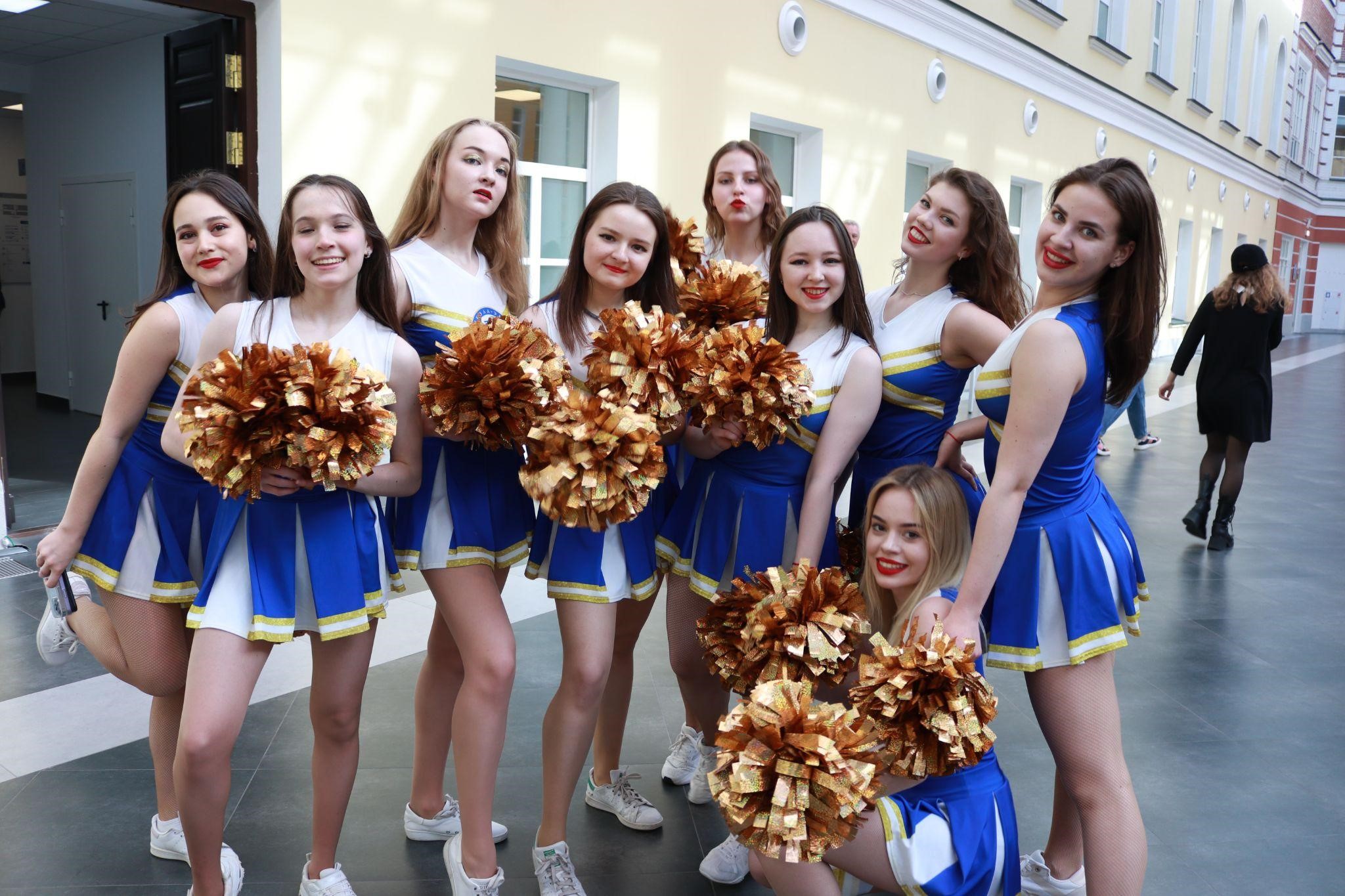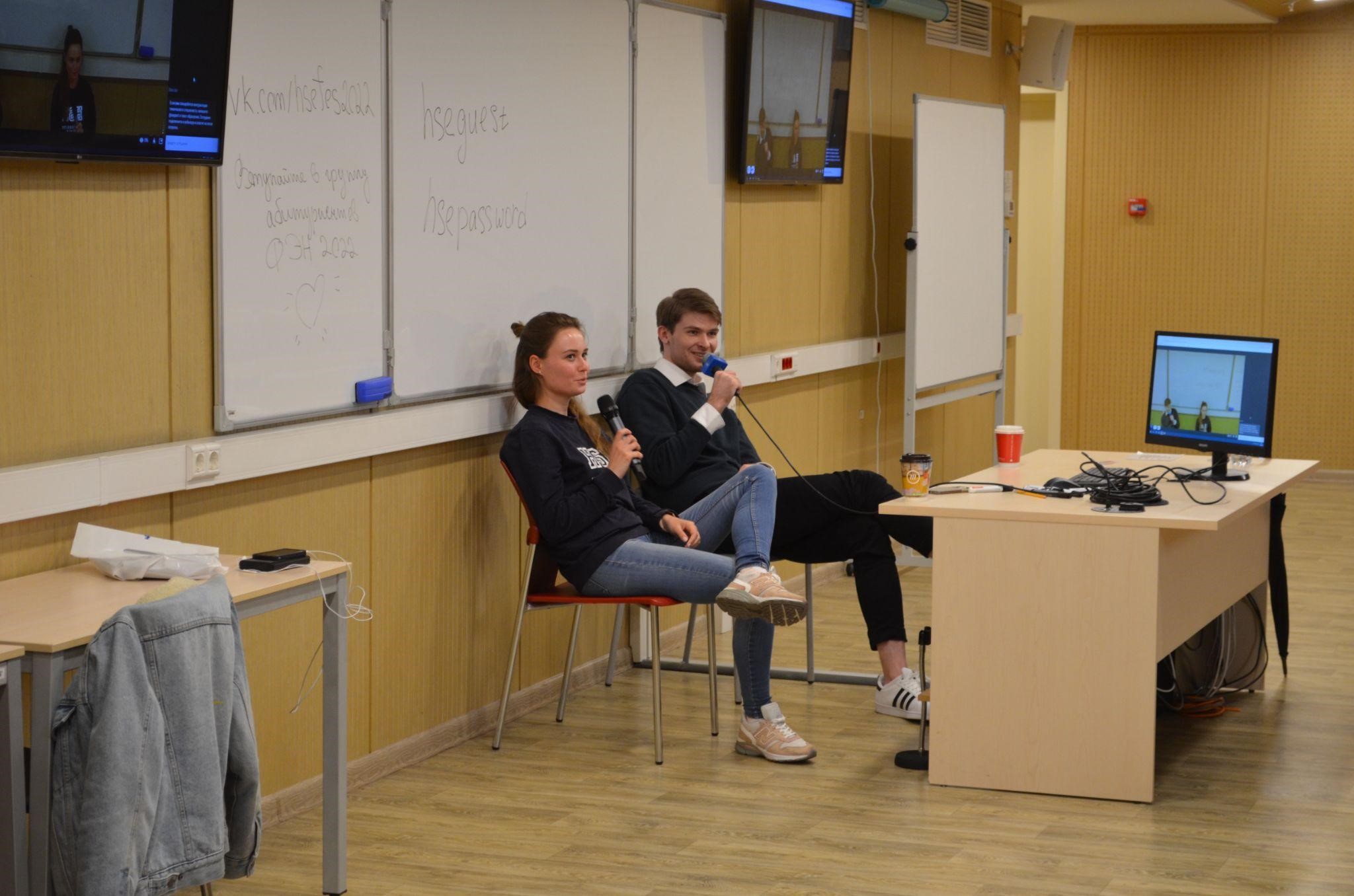Anti-lectures, Cake and Soap Bubbles: HSE Faculty of Economic Sciences Celebrates Its 30th Anniversary

This year’s jubilee programme of Economfest turned out to be particularly eventful. Congratulations from university leaders, meetings with teachers, games, contests, quizzes, a job exchange with KPMG and Changellenge, as well as popcorn, cotton candy and cake were prepared for students, applicants and guests of HSE University.
On the day of the event, the central atrium of HSE University on Pokrovsky Bulvar looked both like the site of an economic forum and a music festival. The space was divided into thematic sections, where visitors could communicate with experts, teachers and graduates of the Faculty of Economic Sciences. There were also areas for board games, office volleyball, and ping pong, while HSE Dance club organized jazz-funk dance lessons.
The columns of the atrium were decorated with balloons, soap bubbles were floating around, and on special boards all students could mark their faculty or leave a message, continuing the phrase ‘I love HSE University because…’
‘I congratulate you on this faculty’s anniversary. It seems right to me that you, the students of this faculty, have seized the central atrium of the university. It would be great if it always looked like this: full of student life, full of a celebratory atmosphere,’ says Dmitry Zemtsov, HSE Vice Rector, greeting the participants of EconomFest.
Dean of the Faculty of Economic Sciences, Sergey Pekarski, also congratulated students and teachers. ‘We as economists can be proud of the fact that HSE University actually started with economics,’ he says. ‘Now it’s the Higher School of Everything, but initially it was the Higher School of Economics. And that's why our faculty played a flagship role, and still does. Of course, the success of our faculty depends not only on the teaching staff. The success of the Higher School of Economics and the Faculty of Economic Sciences is a success that we owe to you.’

After the official part of the event, the sports and intellectual competitions began. Competition participants and winners received special tokens, which they could exchange for branded HSE T-shirts, tote-bags and notebooks at the merchandise store. Other participants stood in line for popcorn and cotton candy. Guests could take a gastronomic test: after tasting juices and fruit purees, they had to guess which fruits they were made of. Prospective students could take part in excursions through the labyrinth of buildings, play a financial game or attend a show.
‘I really like the faculty atmosphere,’ says Kristina Simonova, 2nd-year student. ‘Here ambitious students and professional teachers come together to create a community. There are always extracurricular activities taking place. They help to bring harmony to the intense learning process.’

EconomFest-2022 updated the ‘Overheard at HSE University’ format of communication with teachers, which proved so popular at past festivals. Associate Professors of the Faculty of Economic Sciences Elena Kossova and Sergey Volodin answered questions about their life and work at the university, their personal experience and views on the educational process.
In particular, they shared their experience of their first jobs. Sergey Volodin had a chance to be employed as an assistant project manager while studying in the second year of HSE master's programme, right at the start of the financial crisis in 2008. He was let go two weeks after starting work. ‘I wasn't upset at all — I needed to work on my thesis,’ he admitted.
Elena Kossova told the students how, while a doctoral student, she taught the staff of the Institute of Asian and African Countries of Moscow State University to use a text editor. ‘Highly respected people were sitting in front of me, and I was teaching them how to move a mouse,’ she says with a smile.
Sergey Volodin believes that many HSE students do the right thing when they take internships in companies during their studies, but they shouldn't get too carried away with it: students should have time for study, communication, and life. ‘You will work for decades later, and there are only four years of student life,’ he said to the students.
Money Doesn’t Buy Happiness

An informal conversation with students in the format of an anti-lecture was conducted by the teacher Polina Koroleva and the assistant Dmitry Mikhaylov. They attempted to sort out the issues of future employment together and decide whether a job should be something you love or something highly paid and whether a person inevitably faces this problem.
Polina Koroleva said that at HSE University, a teacher at the start of their career receives 30 thousand roubles a month. Dmitry Mikhailov's first experience was even more modest: he started working at the Faculty of Economic Sciences with two seminars a week, thus earning 6 thousand roubles a month.
‘I work in many places: HSE University, HSE Lyceum, three schools, a grammar school, I prepare and organise Olympiads and visit schools,’ says Polina Koroleva. Sometimes you don’t think about money, because you really enjoy your work. ‘I worked in finance for a year — I didn’t like it. There is more drive at the university,’ says Dmitry Mikhaylov.
Both teachers graduated from the Faculty of Economic Sciences. They believe that the value of studying at HSE University is in the quality of its environment: here people have their own topics of conversation, values and life goals. ‘The most important thing you should get from university is an address book or friends in VKontakte and connections through social networks. Your colleagues might well live in different countries, but you can always ask a friend from the USA to pay for a Zoom subscription,’ notes Polina Koroleva.
During the meetings with students, representatives of KPMG and Changellenge talked about vacancies and prospects for working in their companies.
Become an Investor
Students of the Faculty of Economic Sciences organised a financial game ‘Become an Investor’ for applicants. Participants received an equal amount of starting capital, which they had to distribute among different types of investments during eight rounds. Along the way, the students explained how stocks differ from bonds, how the yield varies according to different types of investments and what associated risks they have.
During the game, the participants created their own investment strategies and discussed them, evaluating the effectiveness of the selected steps after each round. The game, created by HSEstudents, randomly distributed income with a set probability, so the finalists, like real investors, in addition to an elaborate strategy, needed to be lucky.
A giant white and blue three-tier cake decorated with strawberries and blueberries, mini meringues and extracts from the microeconomics course including the formula for calculating gross costs, expressed as the sum of fixed and variable costs at each specific level of production, was another highlight of the day.
A master class of HSE Theatre and the cinema club also were held during the event.
‘I am completely satisfied with my studies at the faculty, I have already determined my career path and I am glad that HSE University can provide all the opportunities for this,’ said Anastasia Sotnikova, 2nd-year student. ‘It's great that we have cool events like EconomFest! You can see how much work the organizers have done: there were a lot of amazing activities, presents, and, of course, the most delicious cake in the world!’
Sergey Volodin
Associate Professor, Department of Financial Market Infrastructure
Dmitry Zemtsov
Vice Rector
Polina Koroleva
Lecturer, Department of Theoretical Economics
Elena V. Kossova
Associate Professor, Department of Applied Economics
Dmitry Mikhaylov
Assistant, Department of Theoretical Economics
Sergey E. Pekarski
Dean, Faculty of Economic Sciences
See also:
‘Teaching Is a Learning Experience for Me—Every Question Is an Opportunity to Update My Lecture Material’
Kemal Kivanc Akoz is an Assistant Professor of the Department of Theoretical Economics at the Faculty of Economic Sciences. He has been at HSE University for six years and his current activities include research into marriage market dynamics and information agreements among groups of agents. In this interview with the HSE News Service, Kemal talks about the subjects of his research, the teaching approach that led to him being named one of the university’s Best Teachers, his favourite places to get a coffee in Moscow, and more.
‘I Hope You Have Entered the Economic Profession Consciously’
On November 11, 2024, the HSE Faculty of Economic Sciences hosted a celebration for Economist Day. Many of the university's partners came to congratulate HSE on the occasion. The atrium on Pokrovsky Bulvar hosted booths from VkusVill, Ozon, HeadHunter, Wildberries, and other leading companies. Students and professors participated in quizzes, spun the wheel of fortune, painted, and crafted.
Maxim Reshetnikov: ‘An Effective Open Market Economy Has Been Built in Russia’
On November 11, 2024, during Economist Day in Russia, Maxim Reshetnikov, Russian Minister of Economic Development, spoke to students of the HSE Faculty of World Economy and International Affairs about Russia’s foreign economic activities, how the country managed to withstand unprecedented sanctions pressure, and the current state of its development.
FES Announces the Winner of the Nobel Prize in Economics 2024 Prediction Contest
The HSE Faculty of Economic Sciences summarised the results of its traditional prediction contest. FES holds this contest annually on the eve of Nobel Week. This year, the contest once again attracted participants from different regions of Russia and countries around the world. Remarkably, one participant managed to predict all three laureates of the 2024 Economics Prize.
Try Your Hand at Predicting the 2024 Nobel Prize Winner in Economics
The Faculty of Economic Sciences is launching its annual prediction contest. On October 14, the Nobel Committee will announce the winners of the Sveriges Riksbank Alfred Nobel Prize in Economic Sciences live on air. You have time to prepare and explore the landscape of contemporary economic thought. What topics and areas are considered particularly important and promising at the moment? Anyone can win.
Choosing the Right Server Results in Better Outcomes in Doubles Tennis
The Roland Garros tennis tournament, one of the most prestigious in the world, began on May 26. The prize money for this year's French Open totals nearly 54 million euros, with athletes competing in both singles and doubles events. In doubles tennis, choosing the right strategy for a match is crucial. Athletes' ability to adapt to the dynamics of the match and strategically choose the server can earn the pair up to 5% more points, according to Nikolai Avkhimovich, doctoral student and research fellow at the Laboratory of Sports Studies of the HSE Faculty of Economic Sciences. A paper with the study findings has been published in Applied Economics.
Consumer Prices Decrease in Densely Populated Areas
HSE University economists have proposed a novel approach to modelling monopolistic competition with heterogeneous firms and consumers. The results of collaborative research carried out by Alexander Tarasov from Moscow, his co-authors from HSE University–St Petersburg, together with the Norwegian School of Economics, the University of Pennsylvania, and the Free University of Brussels, have been published in American Economic Journal: Microeconomics.
Football Players Cover Greater Distances During Critical Derby Matches at Home Arena
Researchers at the HSE Faculty of Economic Sciences examined the level of effort that professional football players are willing to exert during a match in absence of financial incentives. It appears that the primary factors driving players to strive harder for victory are the strength of the opponent and the significance of the match for the club. This is particularly noticeable in derby matches between teams from the same city, such as the Moscow derby between CSKA and Spartak on April 25, 2024. The study has been published in the Journal of the New Economic Association.
Participation in Crowdfunding Can Generate up to 73% in Returns Annually
Backers of projects on crowdfunding platforms can expect rewards from their pledges. For example, funding someone's idea on Kickstarter can result in an average annual return of 11.5%, with design projects known to deliver returns as high as 70%. However, it is important to note that these returns do not come in the form of direct cash payments but rather as savings on the purchase of the product once it hits the market. This has been demonstrated in a study by researchers at the HSE Faculty of Economics published in Economic Analysis Letters.
Economists Suggest Using Media's Attention to Bitcoin to Predict its Returns
Researchers at the HSE Faculty of Economic Sciences have studied the relationship between the changes in the bitcoin prices and the media attention to this cryptocurrency. The researchers examined the mentions of bitcoin in the media between 2017 and 2021 and built a mathematical model that revealed the strong relationship between media attention and bitcoin prices. The study was published in the Applied Stochastic Models in Business and Industry journal.


